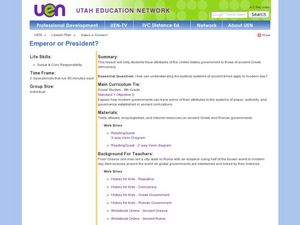Curated OER
The Economics of Health Care
Health care is an industry that impacts every American. Study the economics behind the Health care industry in the US with this supplementary presentation. Intended for use with a McGraw-Hill textbook, these slides will help upper...
K12 Reader
Discrimination Against Gold Rush Immigrants
Immigration to the US has been a topic of discussion for many years. Inform your class about discrimination against immigrants during the Gold Rush with a short reading passage. After reading, class members answer five questions related...
National Endowment for the Humanities
Lesson 2: The United States, France, and the Problem of Neutrality, 1796–1801
While the French Revolution could be considered inspired by the American Revolution, it created thorny problems for the new United States. Should the United States get involved and be drawn into a European drama? Was the US strong...
Alabama Department of Archives and History
Camp Aliceville: The Story of WWII Prisoners of War Who Came to Alabama
POW camps in the United states? In Alabama? The German POW camp in Aliceville, Alabama is used as the focus of a study of the more than 700 camps built in the US during World War II.
Japan Society
Changing Times, Changing Styles: New Japanese Literary Styles of the Late Nineteenth Century
Focusing on Doppo's "Unforgettable People" and late nineteenth century Japanese literature, this resource also leads to discussions of form being dictated by content. Explore the development of new literary styles first-hand by...
Curated OER
Bill of Rights
US history classes explore constitutional rights as they relate to court cases involving teens. Your class must already be familiar with the Bill of Rights before beginning this series of exercises. In preparation for a debate-style...
Rutgers University
How the Allies Won World War II: Island-hopping in the Central Pacific
Using primary source documents, young historians explore the strategies the US used to defeat Japan during WWII. They also learn about the American military experience, and innovations that changed the style of warfare. Young scholars...
iCivics
Argument Wars
From start to finish, here is a fantastic resource that uses engaging activities and an interactive virtual game to teach about major US Supreme Court cases. Your class members will distinguish the primary arguments made in such cases as...
Center for Civic Education
Citizenship Schools and Civic Education During the Civil Rights Movement and in the Present
Your young historians will discover the importance that citizenship education has played in the social progress of the United States as they learn about early efforts to discourage African Americans from voting in the 1960s.
National Endowment for the Humanities
Albert Sabin and Bioethics: Testing at the Chillicothe Federal Reformatory
Do the ends justify the means? Getting a drug approved in the US is a long and involved process. But at some point out, it involves testing on humans. The ethics of such testing is the focus of a resource that uses Dr. Albert Sabin's...
City University of New York
Presidential Elections and the Electoral College
To understand the controversy surrounding the US 2000 presidential election, class members investigate the rationale behind the Electoral Collage, the intimidation involved in the election of 1876, and the 2004 American League...
City University of New York
Urban Politics: Machines and Reformers
What were political machines and whom did they serve? As part of a study of US immigration patterns and how these patterns influenced politics, groups investigate how Tammany Hall and other political machines gained support from voters.
NOAA
Ground-truthing Satellite Imagery with Drifting Buoy Data
Ground-truthing ... is it even a word? The last installment of a five-part series analyzes how scientists collect sea surface temperature data. Scholars use government websites to compare temperature data collected directly from buoys...
Advocates for Human Rights
Civic Engagement and U.S. Immigration Policy
To conclude their study of immigration and human rights, class members create a civic engagement project centered on an issue of immigration and designed to influence US immigration policy. They examine examples of attempts to influence...
Constitutional Rights Foundation
Conservation, Preservation, and the National Parks
Going green? Scholars investigate the creation of the US National Park program. Through diary entries as well as expert testimony, they synthesize information and analyze the need for conservation and preservation. Finally, they display...
State Bar of Texas
White v. Regester
One vote doesn't really matter, right? Class members investigate the concept of voter rights and restrictions using the 1973 Supreme Court case White v. Regester. They view a short video and work in pairs to analyze how people create...
Curated OER
ESOL Government and Commmunity Resources
Students study vocabulary words associated with community services. They label each community service on an index card and match a phrase with the service. They identify community service buildings in the area on a local map.
Curated OER
Emperor or President?
Sixth graders complete a Venn Diagram. In this government comparison lesson plan, 6th graders discuss how rules are similar and different at home, school and in their community. Students learn about the type and structure of the United...
Curated OER
United States & Canada: How Are We The Same? How Are We Different?
Pupils compare and contrast similarities and differences between Canada and the US. In this geography lesson, students read various articles and identify similarities and differences in economies, cultures, geography, climate, and...
Curated OER
History Mystery Message Challenge
Eleventh graders examine the US Constitution. In this American Government lesson, 11th graders gather the history and government facts to solve the history message.
Curated OER
Our Country's People Crossword Puzzle
In this US citizens worksheet, students complete a crossword puzzle by answering 19 clues. They use words from a word bank at the bottom of the puzzle, which includes ancestor, citizen, government, president, and immigrant.
Curated OER
The First Amendment
In this government worksheet, students read the First Amendment to the United States Constitution before reading about the limitations of the laws. They answer 2 short answer questions about the freedoms, and write an essay on the back...
Curated OER
Imposing Democracy
Twelfth graders discuss the probability of imposing a democracy in a country in which there is no history of this type of government being successful. Using the internet, they work together to research Japan's experience with democracy...
Curated OER
Events Leading to the War of 1812
In this US History worksheet, students read a selection of the War of 1812 and fill in the blanks for 10 sentences using a word bank.
Other popular searches
- Us Government Answers
- Branches of Us Government
- Us Government Branches
- Us Government Review Game
- Philosophy of Us Government
- Us Government Quizes
- Us Government Lessons
- Beginnings of Us Government
- Ap Us Government
- Us Government Quiz Es
- Us Government Agencies
- Us Government Lessons'

























